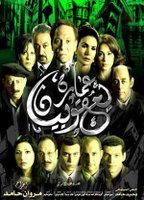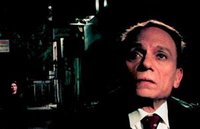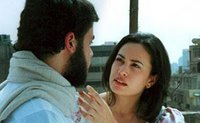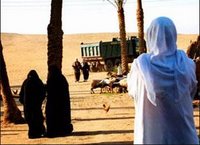The question popped up when I was reading the comments posted by my new friend, aNarki about the movie “Yacoubian Building”. I thought: “why not write about that movie?” It’s worth it! But before I do that, I want to thank aNarki for his kind words about my blog, especially regarding Iron Maiden. They are the best… and their new album, “A Matter of Life or Death”, is just another masterpiece of music! OK, let’s talk about movies, about the movie ““Yacoubian Building””. I didn’t have the chance to watch the movie in theaters, simply because no single theater showed it, or not? So finding the movie on the internet and download it was the best alternative. Every person I know was busy searching on the internet, trying to get a proper copy – For some time, the only “proper” copy can be found on the internet was missing more than half an hour from the total time! However, I had the chance to watch the movie at my best friend’s a month ago. His family and mine share passion for watching movies, and we are used to arrange a specific date from time to time on a weekend to meet and watch a movie. This time they suggested “Yacoubian Building”… They managed to get the full version.
OK, let’s talk about movies, about the movie ““Yacoubian Building””. I didn’t have the chance to watch the movie in theaters, simply because no single theater showed it, or not? So finding the movie on the internet and download it was the best alternative. Every person I know was busy searching on the internet, trying to get a proper copy – For some time, the only “proper” copy can be found on the internet was missing more than half an hour from the total time! However, I had the chance to watch the movie at my best friend’s a month ago. His family and mine share passion for watching movies, and we are used to arrange a specific date from time to time on a weekend to meet and watch a movie. This time they suggested “Yacoubian Building”… They managed to get the full version.
Did I like it? Yes, very much – otherwise it won’t be in my profile’s favorite movies list. Why did I like it? Because it was not like any movie! I will come to that later, so keep on reading. Was it a very long and boring movie? Yes, it was a VERY long movie, but far from considers it boring for a bit. Should I tell more about the story? No, better watch it, and if you want to have some overview, check the movie tralier. Word of advice, don’t look for articles on the internet if you didn’t watch the movie yet, it contains many spoilers. Is it true that the movie was considered the most expensive movie made in the history of Egyptian cinema? Yes, it cost more than $3 million. Is it true that the movie contains a number of adult scenes, which are considered not appropriate for some viewers? Well, the answer is yes, maybe one of the reasons why censorship in many Arab countries chopped off many scenes from the movie, if not totally banned in other countries! Did the film reached out to the level of international standards in movie making? I guess so, I hope so! Otherwise it wouldn’t be enlisted into the Oscar nominations for next year for the category of ‘best foreign film’!
To start with, I couldn’t hide my aggregation towards the dark and pessimistic view of most  events and characters alike in the movie. What made me also little sad is the “concept of comparison” between past and present: by considering the past as very nice, and how Egypt from social perspective went gradually down hill in the last 30 years… hey, that was not a spoiler, for two reasons: first, we all know that this is the reality, unfortunately; yesterday is much better than today in most of Arab countries. Second, I am sure that millions of people watched the trailer of the movie tens of times on TV channels, especially watched the legendary Adel Imam’s rants: “we live in a mutant society…everything was better in the past…”
events and characters alike in the movie. What made me also little sad is the “concept of comparison” between past and present: by considering the past as very nice, and how Egypt from social perspective went gradually down hill in the last 30 years… hey, that was not a spoiler, for two reasons: first, we all know that this is the reality, unfortunately; yesterday is much better than today in most of Arab countries. Second, I am sure that millions of people watched the trailer of the movie tens of times on TV channels, especially watched the legendary Adel Imam’s rants: “we live in a mutant society…everything was better in the past…”
However, that did not spoil my enjoyment of watching the film, especially with the development of the story or pack of stories, minute by minute.
Everyone knows (by now) that the movie dealt with a number of  critical (and for some sensitive) subjects in Egyptian society. Well, it is not fair to say this, because these subjects are also present in other Arab societies, and not limited to Egyptian. For instance, the movie is hit indirectly hard on the issue of government corruption: this theme has been dealt with in many Egyptian movies, but in this film it did not need a scientist to figure out the hints to certain high-level corrupted political figures in power from past and present Egypt!
critical (and for some sensitive) subjects in Egyptian society. Well, it is not fair to say this, because these subjects are also present in other Arab societies, and not limited to Egyptian. For instance, the movie is hit indirectly hard on the issue of government corruption: this theme has been dealt with in many Egyptian movies, but in this film it did not need a scientist to figure out the hints to certain high-level corrupted political figures in power from past and present Egypt!
Corruption was not only about money and power; the movie showed a wider aspect to corruption when very sensitive issues like poverty, injustice, homosexuality, and even Islamic extremism were related. In addition, showing the contradiction in the behavior and attitude of most of the characters was the most obvious (and dangerous) dilemma in society, by letting the viewer sees certain character believe in something, express his or her beliefs very loud, and then act to the opposite of these beliefs – and I am not talking about religious belief, only, it includes love, respect, successful career, even humanity and simplicity in dealing with each other!
It didn’t stop to that limit, the movie also showed how a person can play the role of a rebellion against his or her principles, by becoming something new, good or bad, resisting these principles they grew up with, and for some is influenced by the same people who preach these principles. On many occasions and with different characters in the movie, those people do the extreme just to take chances where he or she can hopefully see a blink of a light in a dark and somber reality.
against his or her principles, by becoming something new, good or bad, resisting these principles they grew up with, and for some is influenced by the same people who preach these principles. On many occasions and with different characters in the movie, those people do the extreme just to take chances where he or she can hopefully see a blink of a light in a dark and somber reality.
Speaking of power and abusing power, this has been shown in the movie like in any recent movies criticizing the political system in Egypt. What differentiates this movie from other movies is how it showed those who seek power as tyrants, but at the same as victims of a bigger game. It didn’t limit this to certain characters of a particular life-style, but it included others in society from low and high classes, people from different faith and beliefs, residents from various locations and areas. They were either having been forced in participating in this bigger game or choose to do so for personal reasons.
Homosexuality as a topic in the movie did go further than the common theme (or what people think the common theme) when it showed unfairness for some due to a certain situation, even for some it has been used as a tool for terror! I don’t recall if there is a similar Arabic movie that showed this subject in the way this movie did. I thought of another Egyptian movie, I think it was called “A Cat on Fire”, starring the great Noor Al Sharief. That movie can be the only one I can think of to might compete in dealing with this subject. I was not surprised to see terrorism and Islamic extremists have their share in this movie, especially in a film where Adel Imam plays in it. Check “Al Irhabi” or “Irhab we Kabab” and many more. Even in “Arees min Jiha Amnia”, you see the reference to this subject when the father was trying to stop the wedding of his beloved daughter by any means. Interesting to see the movie tackle the issue of religion and link it to other social elements in Egyptian society, such as poverty, and ambition. Both, especially in case of ambition, many people believe (some of them are right with such an opinion) that the first step to make their dreams come true is by joining certain group or community. This is natural instinctive behavior for humans to feel that way - anyone heard of Maslow’s Hierarchy of Needs? In the movie, this has been tackled beautifully when it shows someone with a target in life, trying his best to reach that target and find that joining a particular group will help making his dream come true. Interesting, though, is when that person finds himself being rejected by this group or community, look for another group, the result became disastrous, then to another group and so on and on and on. More interesting when we see the dreams of that person take another direction, and with same motivation he pushes himself in order to fulfill that dream. This topic was not only emphasizing on the young boys and girls who are looking for a chance in their cruel world, and where their chances in more than one occasion shatter, it also shows middle-ages men and woman, divorced or widows, single or married, all searching for their dreams with dust from brutal reality almost blinding their eyes.
I was not surprised to see terrorism and Islamic extremists have their share in this movie, especially in a film where Adel Imam plays in it. Check “Al Irhabi” or “Irhab we Kabab” and many more. Even in “Arees min Jiha Amnia”, you see the reference to this subject when the father was trying to stop the wedding of his beloved daughter by any means. Interesting to see the movie tackle the issue of religion and link it to other social elements in Egyptian society, such as poverty, and ambition. Both, especially in case of ambition, many people believe (some of them are right with such an opinion) that the first step to make their dreams come true is by joining certain group or community. This is natural instinctive behavior for humans to feel that way - anyone heard of Maslow’s Hierarchy of Needs? In the movie, this has been tackled beautifully when it shows someone with a target in life, trying his best to reach that target and find that joining a particular group will help making his dream come true. Interesting, though, is when that person finds himself being rejected by this group or community, look for another group, the result became disastrous, then to another group and so on and on and on. More interesting when we see the dreams of that person take another direction, and with same motivation he pushes himself in order to fulfill that dream. This topic was not only emphasizing on the young boys and girls who are looking for a chance in their cruel world, and where their chances in more than one occasion shatter, it also shows middle-ages men and woman, divorced or widows, single or married, all searching for their dreams with dust from brutal reality almost blinding their eyes.
I agree that “Yacoubian Building” for some is an uncomfortable experience, but the movie did  not generate all that fuzz only because of homosexuality or government corruption or social degradation, rather than it shows much sensitive social wrongness within Egyptian society in a complex and fully completed chaotic formula. In Arab countries, the movie was tabooed because it gave deep & open illustration in dealing with this subject. Some called it “crossed the line of social principles”. However, In the west, critics were very positive because they say that the movie has dealt with problems in Arab society in a very frank and open way. Some went further by saying that the director of “Yacoubian Building” is trying to change Egyptian society… I find it a little bit exaggerating … but wait… is he??? Is this true?? Or is it that the movie was just overrated… let’s says politicized by some of those who call for “political and social reform to Arab and Islamic world”?
not generate all that fuzz only because of homosexuality or government corruption or social degradation, rather than it shows much sensitive social wrongness within Egyptian society in a complex and fully completed chaotic formula. In Arab countries, the movie was tabooed because it gave deep & open illustration in dealing with this subject. Some called it “crossed the line of social principles”. However, In the west, critics were very positive because they say that the movie has dealt with problems in Arab society in a very frank and open way. Some went further by saying that the director of “Yacoubian Building” is trying to change Egyptian society… I find it a little bit exaggerating … but wait… is he??? Is this true?? Or is it that the movie was just overrated… let’s says politicized by some of those who call for “political and social reform to Arab and Islamic world”?
Saturday, September 30, 2006
What made me like “Yacoubian Building”??
Posted by
MixMax
at
12:19 PM
![]()
Labels: Arab Media, Arabs, Movies
Subscribe to:
Post Comments (Atom)



4 comments:
Interesting. I didn't like the movie much, and I have much to say about the subject. Check it out in an upcoming post on my own blog.
Nice knowning ya. oh and btw how did you come to meet aNarKi?
Hi konfused kid, glad to meet you too.
I will defenitely read your opinion on the movie :)
someone showed me the way here.. Zappy! to be precise.
cool stuff.. lemme read that Yara post. i have a friend who's gonna be the chief acolyte in her temple one day.
isn't she the one who sings حب كبير or حب جديد or something? lemme check..
I read the book and was excited to see the film, even staying up til 3 in the morning to watch it when it premiered on South African television.
The homosexuality and intimate scenes made me uncomfortable, but it wasn't explicit, mostly implied.
Adel Imam( who plays Zaki Pasha)'s monologues on the country's degression as well as other things made the film a political statement.
It's interesting to think that just a few years after release, the country of the book and movie's setting had a revolution and is going through a political transition.
Post a Comment